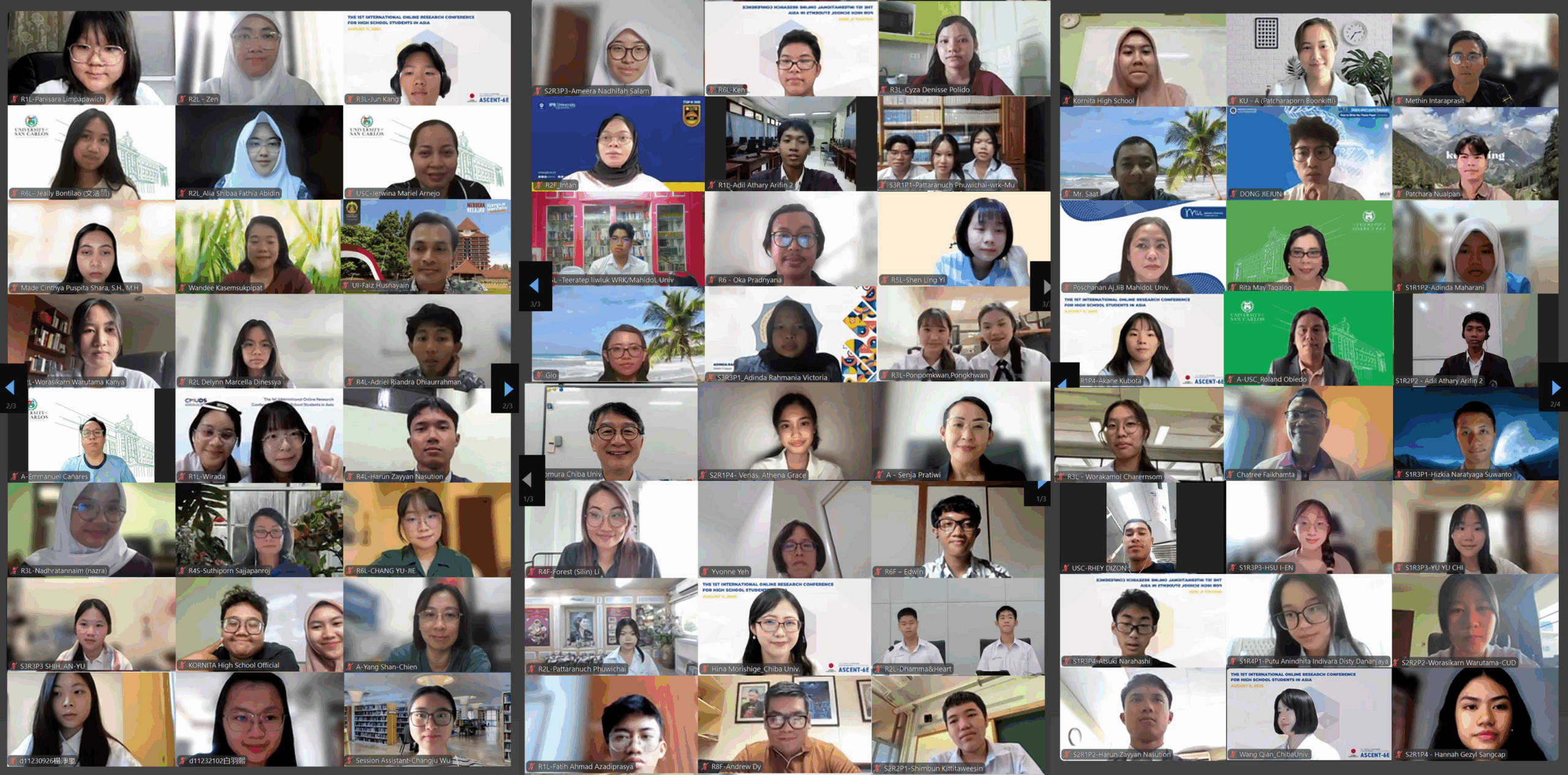2025年8月16日
2025年8月9日(土)、千葉大学STELLAプログラムASCENT-6E主催、千葉大学アジア・アセアン教育研究センター交流協定大学のうち13大学との協力のもと、「第1回アジア高校生オンライン国際研究発表会」をZoomにて開催しました。
本発表会には、日本、タイ、フィリピン、ベトナム、インドネシア、台湾などアジア各国・地域の高校生58名(うちASCENT-6E受講生5名)、教員や大学院生約40名が参加しました。聴講者を含め、午前・午後を通じた延べ参加者数は約160名に達し、研究発表とワークショップを通じて、国境を越えた活発な議論と交流が繰り広げられました。
■ 午前:研究発表
午前中は34件の研究発表が行われ、物理・化学・生物・地学・社会科学など幅広い分野が紹介されました。発表は1人10分、質疑応答5分の形式で進行され、各セッションでは参加者から積極的な質問やコメントが寄せられました。
高校生たちは、独自の発想や地域社会に根ざしたテーマをもとに研究成果を披露し、参加者は多様な切り口から課題解決に挑む姿勢に刺激を受けていました。
参加者からは、「同世代が環境問題や社会課題に真剣に取り組む姿に感動した」「自分の地域の課題を研究テーマにしている点が興味深かった」「他の発表から発表方法や分析の仕方を学ぶことができた」といった声が寄せられました。また、初めて国際舞台で発表した学生からは「緊張したが、大きな自信になった」との感想もあり、午前の発表は学びと刺激に満ちた時間となりました。


研究発表セッションの様子
■ 午後:ワークショップ
午後は「自分の研究と社会とのつながり」をテーマに、Zoomのホワイトボード機能とKJ法を用いたワークショップを実施しました。参加者は小グループに分かれ、ブレインストーミングでキーワードを提案し合い、共同で相関図を作成しました。
短時間のうちに初対面の参加者同士で自然に対話が生まれ、研究テーマをSDGsや社会的課題へと結びつける議論が進みました。国や文化の違いを越えて協力することで、協働の楽しさと意義を実感できるひとときとなりました。
参加者からは、「異なる背景を持つ仲間と協力し、個々の研究を社会課題とつなげられたのが新鮮だった」「ブレインストーミングや相関図づくりを通じて、自分の研究を新しい視点から見直せた」「言語の違いを超えて意見をまとめ、共通の目標に向かえたのが印象的だった」といった感想が寄せられました。また、「普段の授業では得られない国際的な交流や友人づくりの機会になった」との声もあり、午後のセッションは創造性と協働を体感する貴重な時間となりました。


ワークショップセッションの様子

ワークショップセッションで作成された相関図(一部のグループの作品)
■ 参加者の声
━ ✦ ━交流とつながり━ ✦ ━
「さまざまな国の同世代と意見を交わすことで、自分の研究を違う角度から考えることができました。」
「異なる文化的背景を持つ仲間との対話を通じて、新しい価値観や研究へのヒントを得られました。」
「初めて出会った仲間と短時間で信頼関係を築けたことが印象的でした。」
━ ✦ ━協働と発見━ ✦ ━
「グループでの議論を通じて、個々の研究を結びつけ、より大きな課題解決の方向性を見いだせました。」
「他分野の研究テーマと自分の研究がつながることで、新しい発想が生まれるのを実感しました。」
「異なる専門性を持つ仲間と協力することで、自分一人では到達できなかったアイデアにたどり着きました。」
━ ✦ ━学びと成長━ ✦ ━
「国際的な場で発表や議論に挑戦した経験は、自信につながると同時に、今後の研究の方向性を見直すきっかけになりました。」
「他の参加者の発表を聞くことで、自分の研究を社会とどう結びつけるかをより深く考えるようになりました。」
「国境を越えた交流や協働を通じて、研究は一人で完結するものではなく、多様な視点と結びつくことで広がっていくと学びました。」

Zoom会議のギャラリービュー(一部参加者)
本発表会は、高校生が国際的な舞台で自身の研究を共有し、多様な仲間と交流・協働することで、互いに刺激を受け合い、成長する貴重な機会となりました。今回得られた経験を土台に、今後もさらなる発展を目指して継続的に開催してまいります。
On August 9, 2025, the 1st International Online Research Conference for High School Students in Asia was held on Zoom, hosted by the (JST)STELLA Program ASCENT-6E at Chiba University, in collaboration with 13 partner universities affiliated with Asia & ASEAN Center for Educational Research.
The conference brought together 58 high school students from Japan, Thailand, the Philippines, Vietnam, Indonesia, Taiwan, and other parts of Asia (including 5 ASCENT-6E students), along with about 40 teachers and graduate students. Including audience members, the cumulative number of participants across the morning and afternoon sessions reached approximately 160, and lively, cross-border discussion and exchange took place through the research presentations and the workshop.
■ Morning: Presentation Session
A total of 34 presentations were delivered, covering a wide range of fields such as physics, chemistry, biology, earth sciences, and social sciences. Each talk lasted 10 minutes followed by 5 minutes of Q&A, and participants actively asked questions and shared comments in every session.
Students presented findings based on original ideas and themes rooted in their communities, and the diverse approaches to problem-solving inspired everyone involved.
Participants shared impressions such as being moved to see peers earnestly tackling environmental and social issues, finding it interesting that many topics were grounded in local challenges, and learning new approaches to presenting and analysis by listening to others. For first-time presenters, several noted that although they were nervous, the experience became a major source of confidence.
■ Afternoon: Workshop Session
In the afternoon, students joined a workshop under the theme “How to connect our research with society.” Using Zoom’s whiteboard and the KJ method, participants worked in small groups, proposed keywords through brainstorming, and co-created affinity diagrams.
Even among first-time acquaintances, dialogue arose naturally in a short time, and discussions progressed that linked research themes with the SDGs and other societal issues. Working across countries and cultures allowed participants to feel the meaning and joy of collaboration.
Participants commented that it was refreshing to connect individual projects to social challenges together, that creating the diagrams helped them review their research from new perspectives, and that it was impressive to overcome language differences and move toward a shared goal. Many also said the session offered international exchange and new friendships rarely possible in regular classes—a valuable time to experience creativity and collaboration.
■ Voices from Participants
Diversity and Exchange
“I was able to look at my own research from new perspectives by exchanging opinions with peers from various countries.”
“Through dialogue with peers from different cultural backgrounds, I gained new values and hints for my research.”
“It was impressive that I could build trust with new friends in such a short time.”
